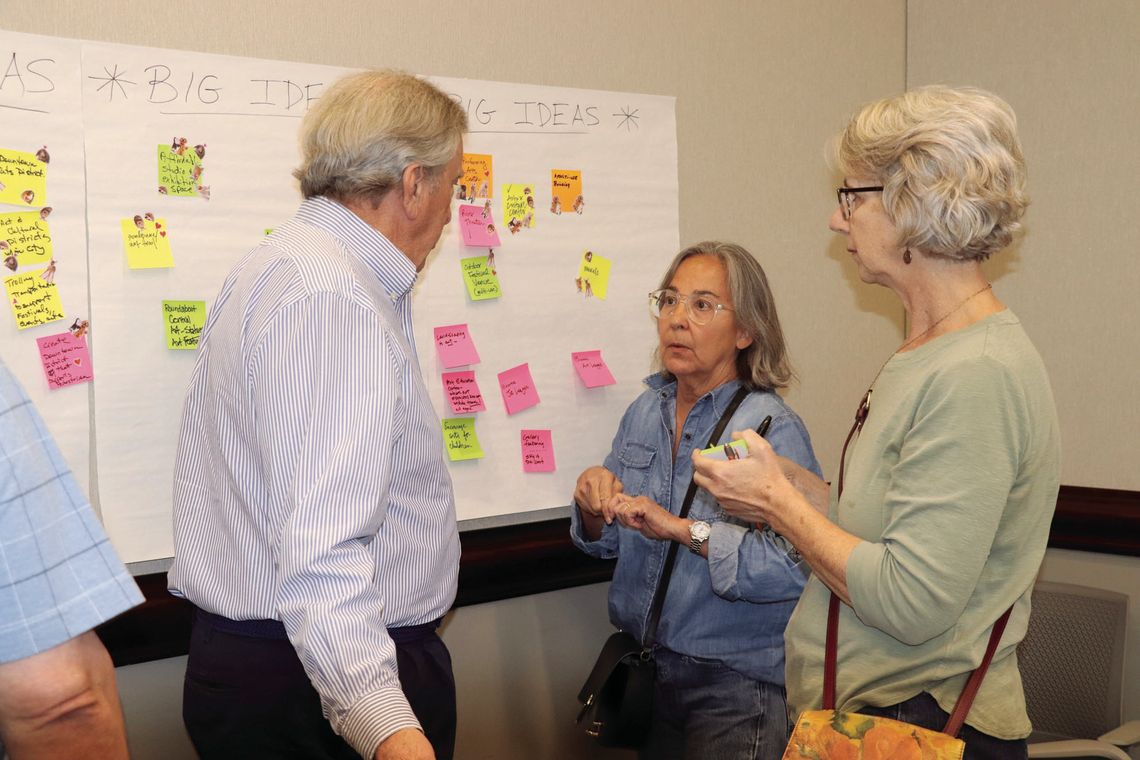Dozens of Post-it Notes stuck to the “Big Ideas” wall at the back of the City Hall conference room Thursday revolved around one theme — development of an arts and cultural center in Boerne.
Representatives from Keen Independent Research met with Boerne area residents concerned or vested in development of the arts in the city, as the formation of an arts and cultural master plan is underway, with results expected in September.
Dr. Roksana Filipowska, consultant with Keen Independent Research, and Alex Keen, Principal, Keen Research, explained the goal of their visit and the plans for development of an arts and culture master plan.
“We are thrilled to be assisting you in identifying how to support existing arts and culture, to create your inaugural arts and culture master plan,” Filipowska said.
The goal, she said, is to create a very usable document, very community- and resident- driven, to be part of the city’s comprehensive plan.
“It’s going to be a roadmap for the city of how to plan for the next five years — identifying cultural assets, and how to support arts and culture in the city.”
Keen Research began the process with the city in February, conducting focus groups and interviews with city officials prior to Thursday’s initial public meeting. Filipowska reviewed a timeline that holds a September release of the finalized arts and culture master plan.
Both Filipowska and Keen stressed that the master plan will be what Boerne residents want it to be, not a formulaic reproduction from the firm’s previous work in cities like Celina and Frisco, Texas.
The master plan “is getting to know what kind of arts and culture are already happening in Boerne. By learning about your history and heritage, we’re going to really be thinking about how we link where the city’s going, with where it has come from,’ Filipowska said.
Before reviewing specific demographic information — including ages, income ranges and spending habits — Keen said it was obvious Boerne is a growing community that will need to harness its goals and visions for the arts.
“We can look at Boerne on a map, we can look at the demographics of Boerne, we can look at pictures of Boerne, but you don’t understand Boerne until you start walking around and driving around,” Keen said. “Data is one thing, but the reality on the ground is something different.”
Keen engaged the group in expressing opinions on what is unique about Boerne — what aspects should be retained, and what can change — “what are some real opportunities for change and growth.”
Keen said their exploratory observations included museums and galleries, arts and crafts organizations, public art, and theater and performing arts assets.
Keen and Filipowska urged attendees to partake in exercises around the room at tables labeled, “What would you want to change,” “what makes Boerne unique that you’d like to keep,” “Benchmark cities,” “mapping Boerne” and “Big Ideas” — to gather thoughts from those assembled.
The “Big Ideas” board, Filipowska said, was a place for attendees to “think big, be creative, tell us what it is that you think would make Boerne a better place.”
The majority of those posts reflected a need for a central art and cultural center or museum. Whether for concerts, art displays and exhibits, speakers’ bureaus or large gatherings, desires expressed at the “Big Ideas” section hit at a city shortcoming — the lack of center for the arts.
Filipowska said the firm eventually will develop the basis for an arts and cultural master plan, which will be presented to the city and public for analysis and feedback before being finalized this fall.







Comment
Comments